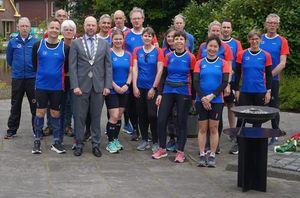As Friedrich Merz prepares for his anticipated election as Germany's new Chancellor on May 6, 2025, he is unveiling his cabinet, a move that is generating significant interest and debate within the political landscape. The Christian Democratic Union (CDU) leader has announced a team of ministers that he believes will effectively address the pressing issues facing the nation.
On April 28, 2025, Merz presented his cabinet lineup, which includes prominent figures from the CDU and its Bavarian sister party, the Christian Social Union (CSU). Key appointments include Thorsten Frei as the Head of the Federal Chancellery, Alexander Dobrindt as the Federal Minister of the Interior, and Johann Wadephul as the Federal Minister of Foreign Affairs. Other notable selections are Katherina Reiche for Economic Affairs, Nina Warken for Health, and Karin Prien for Education.
Merz emphasized the importance of his selections in a post on X (formerly Twitter), stating, "This is our team for Germany: The best for our cabinet. The best for our country." His cabinet aims to reflect a blend of experience and fresh perspectives, with several ministers having previously held significant roles in government.
Among the new ministers, Katherina Reiche stands out not only for her expertise in energy management but also for her previous experience as a member of the Bundestag. She is expected to focus on energy policy, which is becoming increasingly central to the economic agenda. Similarly, Johann Wadephul's appointment marks a significant moment as he will be the first CDU Foreign Minister since 1966, a role that has traditionally been held by smaller coalition partners.
However, the announcement has not been without controversy. Dennis Radtke, the head of the Christian Democratic Labor Force (CDA), expressed dissatisfaction with the cabinet's composition, stating, "A federal government without participation from the CDA is something I have only seen when the CDU was in opposition. It is strange and wrong that no representative from the Christian-social roots of our party is part of the cabinet." This sentiment highlights a rift within the party regarding representation and inclusivity.
Supporters of Merz's cabinet selections, including Manuel Hagel, the CDU leader in Baden-Württemberg, praised the appointments, particularly highlighting Nina Warken and Thorsten Frei. Hagel referred to Frei as the "chief engineer in the engine room of the new federal government," indicating confidence in his ability to manage the complexities of governance.
Warken's selection as Health Minister has also drawn attention. She is seen as a capable leader who can navigate the challenges of Germany's healthcare system, a critical issue given the ongoing discussions about health reforms. Her background as the Parliamentary Executive Director of the CDU/CSU parliamentary group positions her well to tackle these challenges.
As the CDU prepares for the coalition agreement vote with the SPD, which is expected to be approved shortly, the dynamics within the party and the broader coalition will be closely monitored. The coalition is set to feature a black-red government, with both the CDU and SPD holding seven of the 17 ministerial posts, while the CSU will fill three.
In a related development, the CSU has also announced its ministerial candidates, with Dobrindt confirmed as the new Minister of the Interior and Daniela Ludwig as the State Secretary of the Interior. Dobrindt's return to the cabinet is seen as a strategic move, given his previous experience as Minister of Transport from 2013 to 2017 under Chancellor Angela Merkel.
Amidst the cabinet announcements, discussions about economic strategies are heating up. Thorsten Frei, who is likely to become a key figure in the new government, has stated that the coalition aims to implement significant economic relief measures before the summer break. These include a tax relief program that features a degressive depreciation on equipment investments and plans to abolish the controversial supply chain law.
As the CDU and SPD prepare to tackle pressing issues such as economic recovery, the coalition's approach to migration and energy policy will also be scrutinized. The SPD is expected to finalize its ministerial appointments soon after the conclusion of its member decision on the coalition agreement.
In the backdrop of these developments, the CDU's leadership is also facing internal challenges. Carsten Linnemann, the CDU Secretary General, acknowledged the party's disappointing election results, stating that the CDU must reflect on its strategies and improve its performance in future elections.
As Friedrich Merz steps into his role as Chancellor, the effectiveness of his cabinet and the coalition's ability to work cohesively will be critical in addressing the myriad challenges facing Germany, including economic recovery, health reforms, and social unity. With a diverse cabinet and a commitment to addressing key issues, Merz's government is poised to make a significant impact in the coming years.





